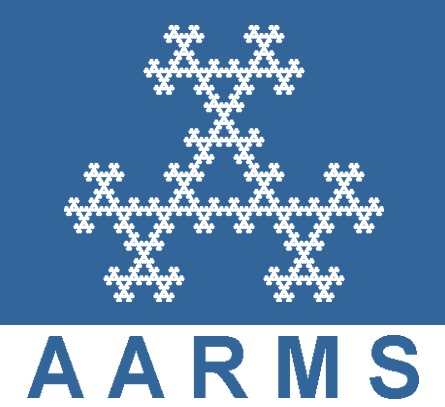Réunion d'été SMC 2015
Université du Prince Edward Island, 5 - 8 juin 2015
Avancées en équations différentielles partielles non linéaires
Org: George Chen et Scott Rodney (Cape Breton)
[PDF]
Org: George Chen et Scott Rodney (Cape Breton)
[PDF]
- STAN ALAMA, McMaster University
Vortex structure in p-wave superconductors [PDF]
-
We study vortices in p-wave superconductors in a Ginzburg-Landau setting. The state of the superconductor is described by a pair of complex wave functions, and the p-wave symmetric energy functional couples these in both the kinetic (gradient) and potential energy terms, giving rise to systems of partial differential equations which are nonlinear and coupled in their second derivative terms. We prove the existence of energy minimizing solutions in bounded domains $\Omega\subset\mathbb{R}^2$, and consider the existence and qualitative properties (such as the asymptotic behavior) of equivariant solutions defined in all of $\mathbb{R}^2$. The coupling of the equations at highest order changes the nature of the solutions, and many of the usual properties of classical Ginzburg-Landau vortices either do not hold for the p-wave solutions or are not immediately evident. These results were obtained in joint work with L. Bronsard and X. Lamy.
- LIA BRONSARD, McMaster University
Weak Anchoring for a Two-Dimensional Liquid Crystal [PDF]
-
We study the weak anchoring condition for nematic liquid crystals in the context of the Landau-De~Gennes model. We restrict our attention to two dimensional samples and to nematic director fields lying in the plane, for which the Landau-De~Gennes energy reduces to the Ginzburg--Landau functional, and the weak anchoring condition is realized via a penalized boundary term in the energy. We study the singular limit as the length scale parameter $\epsilon\to 0$, assuming the weak anchoring parameter $\lambda=\lambda(\epsilon)\to\infty$ at a prescribed rate. We also consider a specific example of a bulk nematic liquid crystal with an included oil droplet and derive a precise description of the defect locations for this situation, for $\lambda(\epsilon)=K\epsilon^{-\alpha}$ with $\alpha\in (0,1]$. We show that defects lie on the weak anchoring boundary for $\alpha\in (0,\frac12)$, or for $\alpha=\frac12$ and $K$ small, but they occur inside the bulk domain $\Omega$ for $\alpha>\frac12$ or $\alpha=\frac12$ with $K$ large. This represents joint work with S. Alama and B. Galv\~ao-Sousa.
- SHAOHUA CHEN, Cape Breton University
A Singular Gierer-Meinhardt System of Elliptic Equations [PDF]
-
In this talk I will present theoretical results on the existence of the steady state solutions to the generalized Gierer-Meinhardt system with zero Dirichlet boundary conditions. I introduce a new functional method to obtain an a priori estimates for the system and then use Leray-Schauder fixed point theorem to prove the existence theorem.
- YURI CHER, University of Toronto
Local Structure of Singular profiles for a Derivative Nonlinear Schrodinger equation [PDF]
-
The Derivative Nonlinear Schrodinger equation $iu_t + u_{xx} +i \left(|u|^2u\right)_x = 0$ (DNLS) is a canonical equation that originally appeared in the study of Hall-MHD equations under a long wavelength scaling. Solutions to the DNLS exist in $H^1$ locally in time and can be extended for all time provided the initial conditions are small enough: $\|u(t=0)\|_{L^2} < \sqrt{4\pi}$ (Wu 2014). Well posedness for large initial data remains an open problem.
Recent numerical simulations of an $L^2$-supercritical generalization to the DNLS provide evidence of finite time singularities. Near the singularity, the solution is described by a universal profile that solves a nonlinear elliptic eigenvalue problem depending only on the strength of the nonlinearity. In this work, we use asymptotic analysis to describe the deformation of the profile and the parameters in the limit of criticality. We compare our results to a numerical integration of the problem. This is a joint work with G. Simpson and C. Sulem.
- MAXIME GAZEAU, University of Toronto
Spectral gaps and Bloch decomposition for the linearized Water-Waves equations [PDF]
-
In this talk, I will consider the spectral problem for the Dirichlet -- Neumann
operator of the unperturbed free surface associated to the linearized water-waves equations
about equilibrium. In the case in which the bottom boundary is a small periodic perturbation of constant depth, this spectral problem admits a Bloch decomposition in terms of Bloch eigenvalues and eigenfunctions that can be constructed analytically. I will describe this construction and show that the spectrum consists of a series of bands separated by spectral gaps. This is a joint work with W. Craig, C. Lacave and C. Sulem.
- HYUNJU KWON, University of British Columbia
Some norm inflation results in fluid equations [PDF]
-
I will discuss a class of nonlocal models in fluid dynamics. The basic issue is to understand the inflation of norms in various critical function spaces.
- ROBERT MCCANN, University of Toronto
The instrinsic dynamics of optimal transport [PDF]
-
The question of which costs admit unique optimizers in
the Monge-Kantorovich problem of optimal transportation between arbitrary probability densities is investigated.
For smooth costs and densities on compact manifolds, the only known examples for which the optimal solution is always unique require at least one of the two underlying spaces to be homeomorphic to
a sphere. We introduce a (multivalued)
dynamics which the transportation cost induces between the target and source space, for which
the presence or absence of a sufficiently large set of periodic trajectories plays a role in determining whether or
not optimal transport is necessarily unique. This insight allows us to construct smooth costs on a
pair of compact manifolds with arbitrary topology,
so that the optimal transportation between any pair of probility densities is unique.
- MING MEI, McGill University and Champlain College St.-Lambert
Asymptotic behavior of solutions to reaction-diffusion equations with time-delay [PDF]
-
In this talk, we consider a mono-stable reaction-diffusion equation with time-delay, which represents the population model of single species like Australian blowflies. When the system of equations is non-monotone, it possesses some monotone or non-monotone traveling waves dependent on the time-delay to be small or big. We clarify that, for a certain given initial data, the corresponding solution will converge to a certain monotone or non-monotone traveling wave, where the wave speed can be specified due to how fast the initial data vanishes at far field $x=-\infty$, the location of the wave can be also determined by the given initial data, and the shape of the wave is determined by the size of the time-delay.
- BRENDAN PASS, University of Alberta
Wasserstein barycenters over Riemannian manifolds [PDF]
-
I will describe joint work with Y.-H. Kim (UBC). We study barycenters in the space of probability measures on a Riemannian manifold M, equipped with the Wasserstein metric. Under reasonable conditions, we prove absolute continuity of the barycenter (which is itself a measure on M). As applications, we prove Jensen type inequalities for various displacement convex functionals, as well as a Riemannian version of Vitale's random Brunn-Minkowski inequality.
- SCOTT RODNEY, Cape Breton University
A Meyers-Serrin Theorem for Degenerate Sobolev Spaces [PDF]
-
It is well understood that degenerate elliptic PDEs in divergence form play an important role in many areas of mathematics. For a non-negative definite measurable matrix valued function $A(x)$ and $1\leq p<\infty$, the degenerate matrix-weighted Sobolev spaces ${\cal{H}}^{1,p}_A(\Omega)$ (defined as a completion of $C^\infty(\Omega)$) and ${\cal W}^{1,p}_A(\Omega)$ (defined as a collection of functions with locally integrable distributional derivatives) play a central role in regularity theory and applications. In this talk, I present joint work with D. Cruz-Uribe and K. Moen that gives a sharp condition on the matrix function $A$ for the equality ${\cal{H}}^{1,p}_A(\Omega)={\cal W}^{1,p}_A(\Omega)$.
- YUZHAO WANG, Memorial University of Newfoundland
Nonlinear hyperbolic Shcr\"odinger equations [PDF]
-
Cubic nonlinear Shcr\"odinger equations are extensively studied and well understood in different settings, such as Euclidean, periodic, semi-periodic and even on compact manifold. However, its hyperbolic counterparts, which includes Ishimori system and hyperbolic DS system, are much less understood. In this note, we try to understand the local behaviour of cubic nonlinear hyperbolic Schr\"odinger equations under semi-periodic setting. The main difficulty comes form the Fourier series raised from the periodic dimension, we manage to control it via major arc decomposition argument.
- JIE XIAO, Memorial University
Entropy Flux - Electrostatic Capacity - Graphical Mass [PDF]
-
This talk will show that the optimal inequality
$$
\mathsf{F}(K,\kappa)\le\mathsf{C}(K)\le 2(n-2)\sigma_{n-1}\mathsf{M}(\mathbb R^n\setminus K^\circ,\delta+df\otimes df)
$$
holds for the entropy flux $\mathsf{F}(K,\kappa)$, the electrostatic capacity $\mathsf{C}(K)=\mathsf{C}(\partial K)$ and the graphical mass $\mathsf{M}(\mathbb R^n\setminus K^\circ,\delta+df\otimes df)$ generated by a compact $K\subset\mathbb R^{n\ge 3}$ with non-empty interior $K^\circ$ and smooth boundary $\partial K$.
- XINWEI YU, University of Alberta
On Stationary Solutions to Doi-Onsager Models [PDF]
-
We study the Doi--Onsager models with general potential kernel in dimensions two and higher, with special emphasis on the classical Onsager kernel. We obtain the uniqueness of the trivial solution for low temperatures as well as the local bifurcation structure of the solutions through application of topological degree methods. This is joint work with Dr. Mohammad Ali Niksirat.







